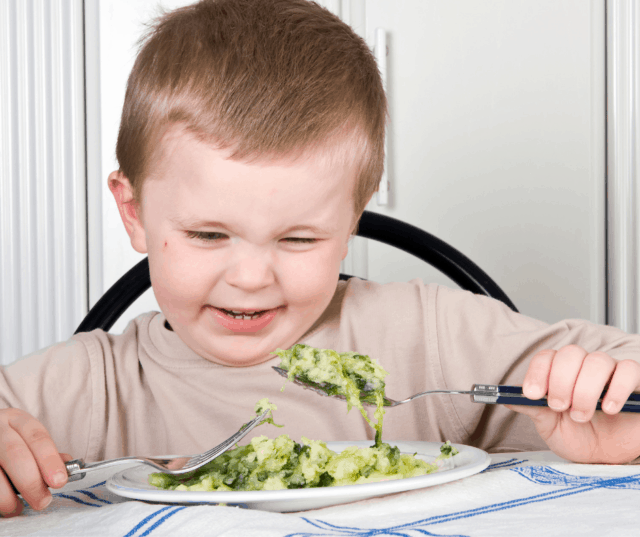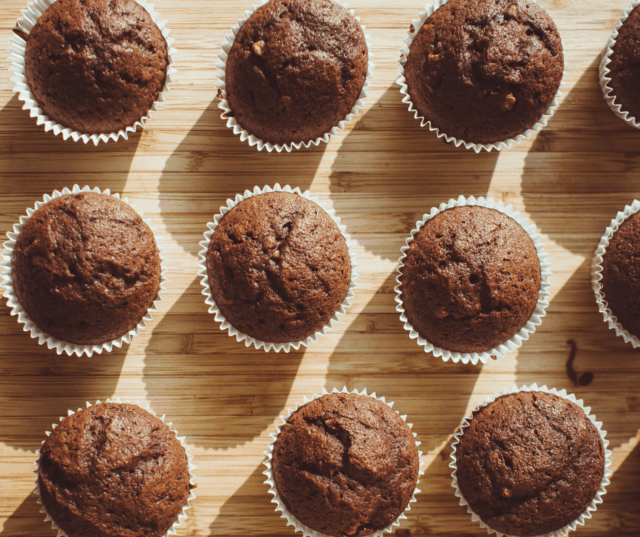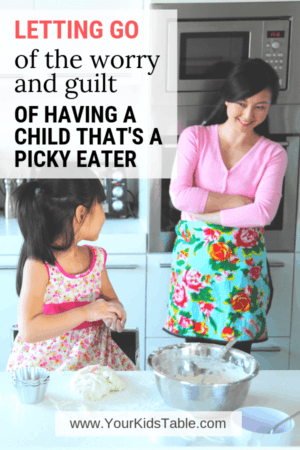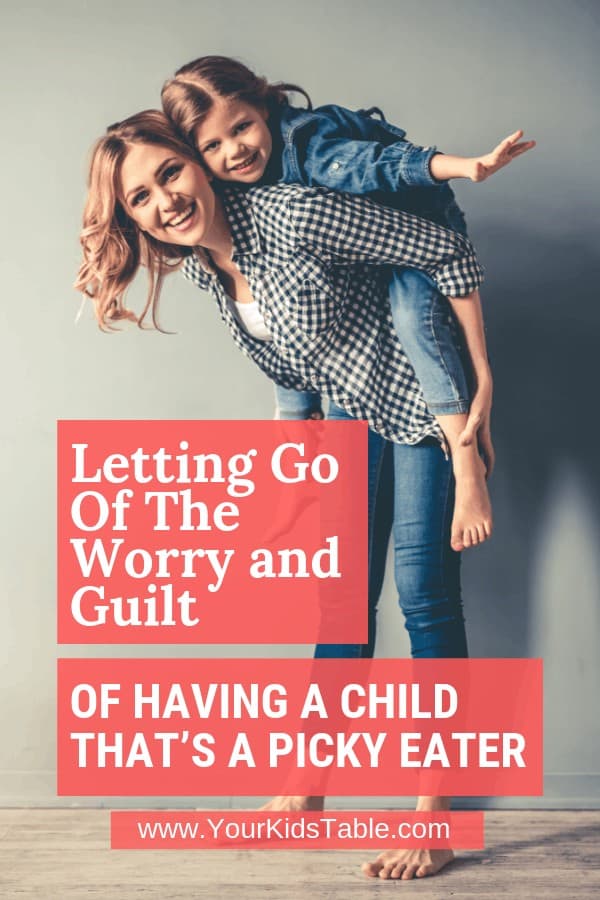The weight of worry and guilt when you have a picky eater can be crippling! Find out how a mom of an extreme picky eater turned it all around!
Have you ever felt the heavy worry of wondering if your child is getting enough nutrition or if they’re healthy?
If they’re nourished, if they’re getting all the nutrients they need?
I bet your answer is yes, if you have a picky eater. And, a close cousin to that worry is guilt. Guilt that you’re doing something wrong. That somehow it’s your fault that your child isn’t eating well.
If you’ve ever felt that way (or do on the daily), then this message is for YOU. Because when we’re so weighed down by the worry and guilt, it’s so much harder, if not nearly impossible, to help our kids learn to eat new foods. You’ve got to shed that damaging perspective.
My Interview With a Mom That’s Been in Your Shoes
To help you do that, I’ve asked Lindsay Gantt from Speak Eat Learn to share how she let these all consuming feelings go, and in doing so, it became the turning point that allowed her son to finally begin eating new foods, even loving them.
Wait to you hear what he’s eating now!
Below you’ll find our interview with some amazing takeaways and a perspective shift that could be the beginning of your child eating new foods. At the end, you can find the actual video interview if you want to take a peak!
When Did You First Notice That Your Child Was a Picky Eater?
Alisha: Can you tell us about when you first noticed that your child was a picky eater?
Lindsay: I would say it was around two. And I noticed he wouldn’t eat some of the foods that he normally would, specifically really messy or wet foods like spaghetti, applesauce, or yogurt. Then he got to a point where he didn’t want to be messy at all. And so, part of me in my feeding therapist mind, knew that’s kind of a red flag.
And then the other side of me said, “Well, I don’t know. Maybe that’s just his personality.” He’s a very cautious child. He never really liked to get messy too much, in general. So in my mind, I kind of went back and forth.
And so I kept saying, “I think it will just get better.”
But, it didn’t.
Alisha: When did you hit the point when you knew you had to do something about it, that you were at a crossroads where your son’s picky eating was really affecting the quality of everybody’s life?
Lindsay: I’m trying to remember when I took your Mealtime Works course, it was before that. He was in preschool, and he was the type that would literally go all day without eating and would be fine. And there I am saying, “I know you’re hungry, you’ve got to be hungry.”
Or he would stay really far from the table and start to gag. He was very hypersensitive to smells, and our dinner times were just miserable.
I love to cook. We’re a family that eats dinner at the table every night, and we want our meal times to be great, but they were horrible. It was a lot of back and forth, fighting for control.
I’d stay up all night, I would worry because I knew he wasn’t eating. He’d come to the dinner table, he’d eat two bites and then say he was done. He never really said he was full because I honestly don’t think he knew what full meant, so he’d be done. So I think that’s when I realized, “I’ve got to do something.”

It Can Feel So Lonely Having a Picky Eater…
Alisha: What were you specifically worrying about? I think this is so important because what I hear all the time and what I even experienced, even though I knew nothing could be further from the truth, is that dealing with a picky eater can feel lonely. Isolating.
And I know a lot of other people are reading this feeling the same way. So, what were the kind of worries that were keeping you up at night?
Lindsay: I am very health conscious. I was worried because he didn’t eat any vegetables. Sometimes he would eat a raspberry or a little bit of broccoli.
But overall, we didn’t have fruits and vegetables. And for me, somebody that eats a very high plant based diet, that worry consumed my thoughts. I knew he wasn’t getting enough.
“I Should’ve Done Something Sooner”
Alisha: A lot of parents start to then blame themselves because they’re not seeing any progress. So like you said, you thought, “Oh, maybe it’ll get better.” It’s common for us to hear that they’ll grow out of it. And while there’s a little bit of truth to that, it’s such a slippery slope.
For a lot of picky eaters, they don’t grow out of it, especially ones with the red flags of not wanting to get messy or not wanting to come to the table. That’s beyond the boundaries of “typical picky eating”. (Take the picky eating quiz to find out what type of picky eater you have.)
Did you feel like there was a point where you started to blame yourself and feel guilty?
Lindsay: I had a ton of worry, a ton of frustration, and I guess the guilt part of me was more that I should have done something sooner because I saw all the signs. I’m in people’s homes as a speech therapist, helping their babies with feeding disorders and swallowing disorders. But here I am with my then three-year-old, and we’re eating like 10 foods.
Head over to Will My Child Outgrow Picky Eating? to learn more!
Her Turning Point
Alisha: But, what I do know now, is that all of the worry and the guilt that you felt is 100% not the case anymore. Your life looks a lot different. So what do you think was the turning point for you in being able to really let go of all that worry and guilt. I remember that there was one thing in particular that really started the change.
Lindsay: I remember when I took your Mealtime Works course, and you said there were things that could contribute to picky eating, and one of them was health conscious parents.
I remember hearing that and thought, “Oh my God, that’s so me.”
My husband and I did the Mealtime Works class together, which I think really helped for us to be on the same page. But he said, “Why don’t you just buy him whatever you think he would eat?” I would not let myself go there in the grocery store before that point. But then after we talked about it, I realized, this isn’t going to be forever. We’re not going to be eating the same food 10 years from now.
If this is what I know he would eat and love and enjoy and just sit down and be able to have a muffin and be happy about it, then that’s what I’m going to do. I think that was it for me. I knew, we could start here and then we’ll end up there by adding in foods slowly and methodically. And that really changed the game for me.

For the Love of “Unhealthy” Foods, Snacks, and Treats
Alisha: You said you were health conscious, but you weren’t letting him eat foods that you thought were unhealthy. Right?
Lindsay: Right. And I realized I’m part of the problem. I was contributing to the reason we weren’t moving forward because I wouldn’t buy foods with certain ingredients in them. It’s not a healthy place to be for a parent.
And, we’d also say things like, “Oh. Well, he would never eat that.” And that whole mindset is so negative. And when they hear that, I really think they start to think that as well. It’s a negative environment to be in.
Alisha: It seems backward at first, right? Because you think, “Well, how is this helping them if I’m giving them something that might be high in sugar or super processed or even have artificial food colors in it.”
When you’re health conscious yourself, how is that going to get them to eating the healthy foods that I want them to eat? It seems like you’re going down the wrong path, but the opposite is true. And you, Lindsay, are the most perfect example of this. So what happened once you started to let your son eat these other foods?
Lindsay: Well, it was great. The other thing we did with that, obviously, is the no pressure, like 100% our mealtimes just became about family time.
But, I remember when I went to the grocery store, it was so freeing.
I went through the store looking at foods thinking, “Oh, they would love this. Oh, they would love that.”
I decided not to spend an hour looking at ingredients. I bought our staples, and I bought little mini chocolate chip muffins.
We had them for breakfast and they were like, “Oh my gosh”. And they ate them up. So, then I went back to the grocery store with them and I said, “These are some choices we could pick”. They were box-made, but were a little bit healthier. And I said, “Why don’t you pick out one of these chocolate chip muffins?” And so, he picked out one of those. He wouldn’t have done that before. We slowly made changes from there.
Alisha: But because you let him have the overly processed and not super healthy food, it then allowed you to transition to healthier foods. And I think you had a similar experience with a Lunchable, right? You were cringing, but bought it anyhow?
Lindsay: I did, I bought it. And he was so happy.
We have to remember, eating is social. It’s something we do with our friends. When they are at lunch, they want to have what their friends are having, and they want to have that connection. And he didn’t have that because he wouldn’t eat sandwiches. The Lunchable allowed us to transition to so many different foods.
The Chick-fil-A Milestone!
Alisha: You knew you had really reached a milestone when your son ate at Chick-fil-A for the first time. How did that come to be?
Lindsay: So when we started, he would eat just grilled chicken, nothing on it. And then wouldn’t eat it from restaurants, only if we made it at home. And then we got to a point to where he was eating all kinds of things.
And so, it was after a baseball game and we had his friend in our neighborhood with us and we said, let’s go to Chick-fil-A. My son got chicken nuggets, and I remember coming home and telling my husband.
We both looked at each other and were like, “Can you believe we just went to Chick-fil-A and he ate what everybody else was eating.”

What is His Diet Like Now?
Alisha: You said at the beginning that your son was at less than 10 foods. What types of foods and how many foods is he eating now?
Lindsay: Now, he’ll eat anything.
I make homemade muffins, they’re called magnesium muffins. And they’re made with ground pumpkin seed, sweet potatoes, honey, ground flax, eggs, and little mini dairy free chocolate chips.
He eats any of my homemade breakfast stuff.
He eats sub sandwiches. He’s never had a sub in his life until this year. He eats boiled shrimp, he eats fish. He got fish tacos from a restaurant the other night.
He eats berries and apples and grapes.
He’ll eat broccoli, and broccoli rice. He’s not that big on vegetables, but what he does like is to mix vegetables in things.
He ate lentil meatballs the other night.
He’ll do zucchini in anything.
He likes things like mushrooms.
Click here to check out Lindsay’s healthy pancake recipe.
Her Advice to You
Alisha: What advice would you give to other parents that are deep in the worry and stress with a picky eater? For parents that don’t know what to do to help their child.
Lindsay: Trust the process. We will get through it, it will get better, and it did. I feel like every stage that you go through, there’s going to be a challenge. But if you can somehow find that mindset in your heart, to know that you’ll get past it. I get all choked up, but I think turning mealtimes into something positive.
How You Can Get Those Next Steps?
Make sure you sign up for our Picky Eating Essentials Guide if you haven’t already. Along with the guide, you’ll get the 9 Steps to Improve Your Kid’s Eating Printable! Click here to get the guide!
More on Picky Eating
Why Getting Sick Can Snowball Into Picky Eating
Are You Taking Picky Eating Personally? This is Why You Shouldn’t
10 Extreme Picky Eating Red Flags that You Need to Know
Lindsay Gantt is a wife, mom, certified healthy hands cooking instructor, and pediatric speech-language pathologist. She has worked in the area of early intervention (birth-five years old) for over 10 years and could not be happier with where life has taken her. Speakeatlearn.com combines her love for speech-language therapy, feeding therapy, cooking, and educating on the importance of whole food plant based nutrition.

Alisha Grogan is a licensed occupational therapist and founder of Your Kid’s Table. She has over 14 years experience with expertise in sensory processing and feeding development in babies, toddlers, and children. Alisha also has 3 boys of her own at home. Learn more about her here.

This sounds so hard for me! i am also a health nut and have a hard time giving things that I consider to be unhealthy to my picky child. I think I need to see more of how this actually works. i feel like my child gets the unhealthy food everywhere we go and i would like to the home to be the one place with healthy food